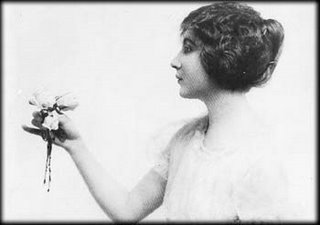Today's Super-Special Insomnia Report Guest Blogger: Anais Nin!

On many of the evenings Sabina spent with Mambo they did not go anywhere.
On evenings when Sabina had agreed to return to Alan at midnight, her going out with a friend would not have been fatal or too difficult to explain; but there were evenings (when she wanted to spend a few whole nights with her lover) when she had been obliged to say she was travelling, and then when Mambo suggested: "Let's go to a movie," the conflict was started. She did not like to answer: "I don't want Alan to see me." This made her feel like a child being watched, or a woman in a state of subjection, so much did her feelings about Alan seem not like those of a woman wanted to be faithful or loyal but those of an adolescent escaping home for some forbidden games. She could only see Alan as a kind father who might become angry at her lies and punish her. She would also, if she mentioned Alan's rights, be forced to confess to Mambo the division in her affections. At times her lies seemed to her like the most intricate act of protectiveness instead of the greatest treachery. Other days she felt tempted to confess, but would be blocked by the knowledge that even if she were forgiven, Alan would expect then a change of life and this she knew she was powerless to achieve.
At mention of the movies she would assent, but as if it were a game of chance she were playing, each time that Mambo suggested one movie, or another, or still another, she weighed them not so much for their qualities as movies, but according to what quarter of the city they were shown at, whether or not it was a movie Alan might care to see, whether it was near at hand (knowing Alan was lazy about going uptown). If she were with Alan she would have to try and remember the movies Mambo had seen, or the ones he wanted to see, and knowing how fanatical he was about movies, to gauge even those he might see twice.
Ultimately, like a gambler, she had to question her instinct.
Once seated at the movies her anxiety increased. Alan might have liked this movie enough to want to see it again, or a friend might have persuaded him to make the effort to go uptown. Could Mambo be sitting in the audience while she sat with Alan, could he have seen her walking down the aisle?
Sometimes she discarded her anxiety as nervousness. At other times she was compelled to go to the ladies' room at the very beginning in order to be able to walk slowly and carefully down the aisle examining the crowd from behind before settling down beside Mambo or Alan. This would relieve her anxiety for awhile, until some fragment of the movie story itself would reawaken it, if a lie were pictured, a false situation, exposure. Above all if it were a spy story.
It was when she saw the lives of spies that she realized fully the tension with which she lived every moment, equal to theirs. The fear of committing themselves, of sleeping too soundly, of talking in their sleep, of carelessness of accent or behavior, the need for continuous pretending, quick improvisations of motivations, quick justifications of their presence here or there.
It seemed to Sabina that she could have offered her services or been of great value in that profession.
I am an international spy in the house of love.
When the anxiety became absolutely intolerable it was transmuted into playfulness. The excitement and risks appeared as a highly flavored, highly humorous game. Then she shifted her position entirely to that of a child escaping surveillance and being amused by her own ingenuity. Then she passed from secrecy to a need of boasting openly of her manoeuvers and would shock her hearers. Both anxiety and humor became interchangeable. The pretenses, escapades, trickeries seemed to her in her humorous moods like gay and gallant efforts at protecting everyone from the cruelties of existence for which she was not responsible. Wits and good acting were employed for such justifiable ends: to protect human beings from unbearable truths.
But no one who listened ever shared her sudden gayety: in their glances she read condemnations. Her laughter seemed a desecration, a mockery of what should be considered tragic. She could see in their eyes the wish that she should fall from this incandescent trapeze on which she walked with the aid of delicate Japanese paper umbrellas, for no guilty party has a right to such adroitness and to live only by its power to balance over the rigidities of life which dictated a choice, according to its taboos against multiple lives. No one would share with her this irony and playfulness against the rigidities of life itself; no one would applaud when she succeeded by her ingenuity in defeating life's limitations.
These moments when she reached a humorous peak above the morass of dangers, the smothering swamps of guilt, were the ones when everyone left her alone, unabsolved; they seemed to be awaiting her hour of punishment after living like a spy in the house of many loves, for avoiding exposure, for defeating the sentinels watching definite boundaries, for passing without passports and permits from one love to another.
Every spy's life had ended in ignominious death.
[Except from A Spy in the House of Love]

